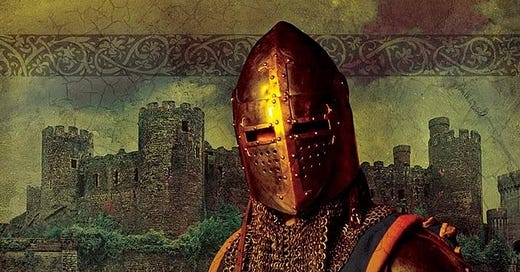And to round off for today - it’s been a busy one - here is a nice review of one of my books, Edward I and Wales, 1254-1307, published by Pen & Sword in 2021.
'This work is a concerted attempt to provide a detailed and balanced analysis of the relationship between King Edward I of England as heir to the throne and as king, and the inhabitants of Wales. The period covered starts with the first time that the Lord Edward was granted lands in Wales by his father, and terminates with Edward’s death in northern England, and the work is also provided with concise synopses of the events leading up to the main focus period of the book, and those which followed. One aspect of the book to be particularly welcomed in a time when this powerful king is the subject of much vitriol with regard to his dealings in Wales and Scotland over and above extensive reference to well-established works by respected academics.
That focus is the primary documentation of government beyond the plentiful (and occasionally rather tabloid) annals of the time, much of which has not been studied in depth before, and which pays particular attention to the full gamut of the aristocracy in Wales, not just those who were primarily Welsh-speaking and of princely status. These include the clergy, the Marcher Lords, the junior lines of the major princely dynasties, the descendants of lesser princely dynasties, and the smaller landholders – as well as the major players of native Wales as they are commonly perceived – the princes of Gwynedd, Powys, and Deheubarth. By utilising resources which permit analysis pertaining to all of these groups, the author is able to provide a more accurate representation of how the relationship between Edward as king and lord, and the inhabitants of Wales, played out. This is more nuanced than many popular accounts would have us believe, and this has inevitably led to a certain amount of criticism, which is unjustified.
The book is not a whitewashing of the king or his actions. It highlights various weaknesses in his relationships with the people of Wales, and does not shy away from critical analysis of these – not least of which was the character of his officers. It is not to be wondered, however, given the militaristic nature of 13th century society, that much of the content is focussed on matters military. This is not purely due to the interests of the author, but also a weakness of contemporary documentation, which is most interested in this aspect of society. The consequence of this is that on occasion the rapid proliferation of names and places can feel a little overwhelming, and although this is surely a question for the publisher rather than the author, I feel that the provision of some illustrative maps would be welcomed. I found myself a little confused at times despite my own fairly reasonable knowledge of the places and people under discussion.
The watersheds of the period will always be seen as the Treaty of Montgomery, the 1276/77 campaign culminating in the Treaty of Aberconwy, and the 1282/3 campaign which ended in the destruction of the ruling dynasty of Gwynedd. However, these events are now put into the wider political context not just of Britain, but also of the rest of Wales, and welcome focus on the rebellions of Rhys ap Maredudd and Madog ap Llywelyn is provided, highlighting that Wales was not quietened even a decade after the Statute of Rhuddlan was issued.
It is the nature and extent of support that Edward enjoyed in Wales as well as the opposition that will come as a surprise (or shock!) to many. The native Welsh had always played off different greater powers against each other, and although it may be fashionable to consider collaboration with England treacherous, the imperial pretensions of the princes of Gwynedd was perceived as negatively as those of the Marchers by a substantial proportion of the native Welsh – even inside the increasingly tax-burdened land of Gwynedd. This was especially true of the uchelwyr – the gentry. Another area of interest for many will be the way that Edward interacted with the Marcher lords. In many ways this was entirely consistent with the domineering way that he interacted with the native Welsh, the Scots from 1290 onwards – and his barons in Gascony. In all cases the result resistance from some, leading to armed conflict.
Other reviewers have commented on the quality of proofreading and endnotes, which admittedly do not add to the experience of reading this otherwise excellent book. Overall I enjoyed the quality of the read - the author’s writing style is accessible and well paced - and the content is excellent, with any questions of his personal interpretation backed up by evidence. I look forward to reading more of the author’s work.'



